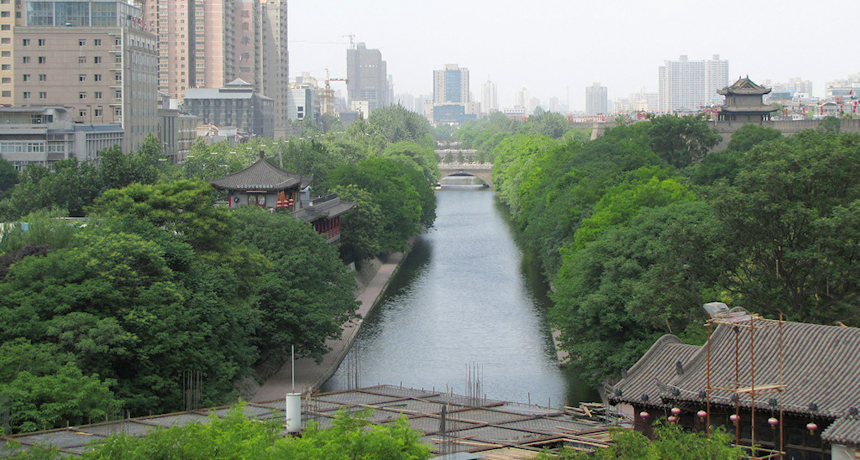Watering plants with wastewater can spread germs
Many of those germs may be capable of causing infections that antibiotics cannot treat

In China, urban parks sometimes irrigate their plants with recycled water. This can flood soils with high numbers of drug-resistant microbes, a study finds. This could pose expose people to germs that are hard to kill.
wiredtourist.com/flickr (CC BY 2.0)
By Beth Mole
Sprinkling thirsty city parks with recycled water may create a breeding ground for hard-to-treat germs. That’s the finding of a survey of parks in seven Chinese cities. Parks that water their plants with treated wastewater were awash in signs of drug-resistant bacteria.
Sewage-treatment plants attempt to clean up the water that has gone down the drain in homes, businesses and hospitals. Yet even after treatment, this water may still carry microbes and antibiotics. If sprayed into the environment, that water now can spread germs and traces of the medicine.
And that’s a bad mix. The more time that bacteria encounter antibiotics, the more likely they are to evolve DNA changes that allow them to survive these germ killers. What’s more, even harmless germs that acquire these changes can prove a hazard. Bacteria have the ability to share their genes with other germs around them.
And if these microbes now infect people or animals (including pets), that can make any infection difficult to treat. Indeed, many of germs have morphed into superbugs, bacteria immune to the effects of two or more antibiotics. That could make them very hard to kill.
Yong-Guan Zhu of the Chinese Academy of Sciences in Beijing and his colleagues surveyed soils in city parks. Those that had received recycled water were tainted with higher levels of the genes that resist the effects of germ-killing drugs. How much more of these genes? Up to 8,655 times as much! Bacteria with resistance genes are usually immune to at least one of the antibiotics that doctors now use to fight infections. Zhu’s team reported its findings July 24 in Environmental Science & Technology.
China uses high levels of antibiotics, notes Amy Pruden. She’s a civil engineer at Virginia Tech in Blacksburg. What’s more, she adds, cities there may not have the same sewage-treatment methods as in the United States. So the new results may represent “the worst-case scenario,” she says.
Still, even the water leaving U.S. treatment plants may contain plenty of drug-resistant bacteria. And increasingly, drought-prone communities are using this water for irrigation. So more research is needed to understand whether irrigating with such water poses health risks, Prudent says — and how big such risks might be.
Power words
antibiotic A germ-killing substance prescribed as a medicine (or sometimes as a feed additive to promote the growth of livestock). It does not work against viruses.
gene A segment of DNA that codes, or holds instructions, for producing a protein. Offspring inherit genes from their parents. Genes influence how an organism looks and behaves.
germ Any one-celled microorganism, such as a bacterium, fungal species or virus particle. Some germs cause disease. Others can promote the health of higher-order organisms, including birds and mammals. The health effects of most germs, however, remain unknown.
immune Able to ward off a particular infection or show no impacts from a particular poison. More generally, the term may signal that something cannot be hurt by a particular drug, disease or chemical.
recycle To find new uses for something — or parts of something — that might otherwise by discarded, or treated as waste.
resistance (as in drug resistance) The reduction in the effectiveness of a drug to cure a disease, usually a microbial infection. (as in disease resistance) The ability of an organism to fight off disease.
sewage Wastes — primarily urine and feces — that are mixed with water and flushed away from homes through a system of pipes for disposal in the environment (sometimes after being treated in a big water-treatment plant).
superbug A popular term for a disease-causing germ that can withstand medicines.







